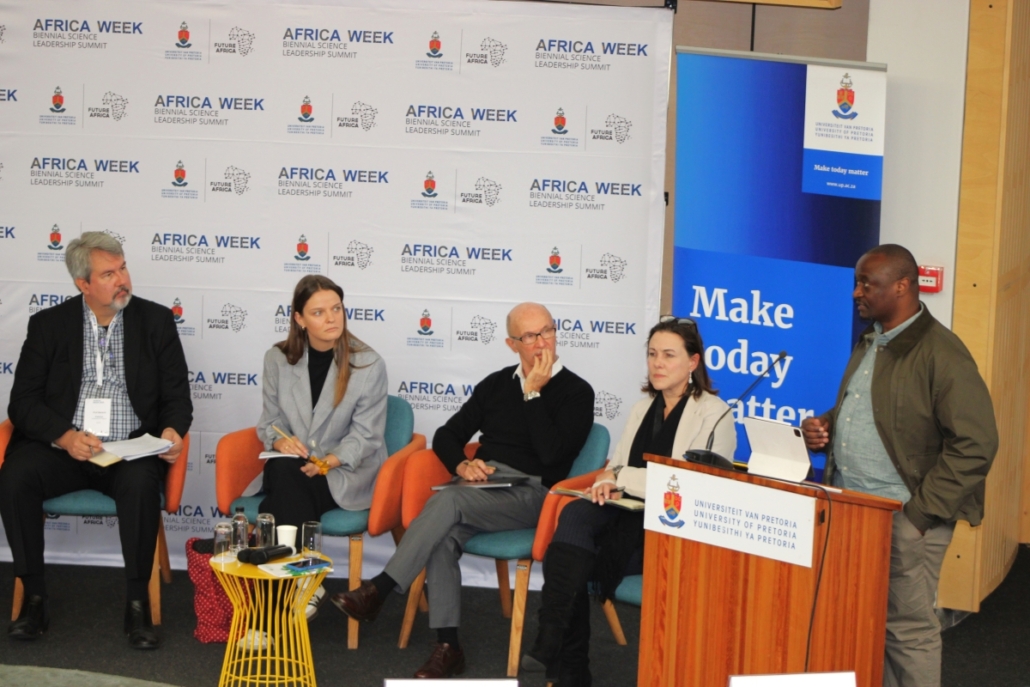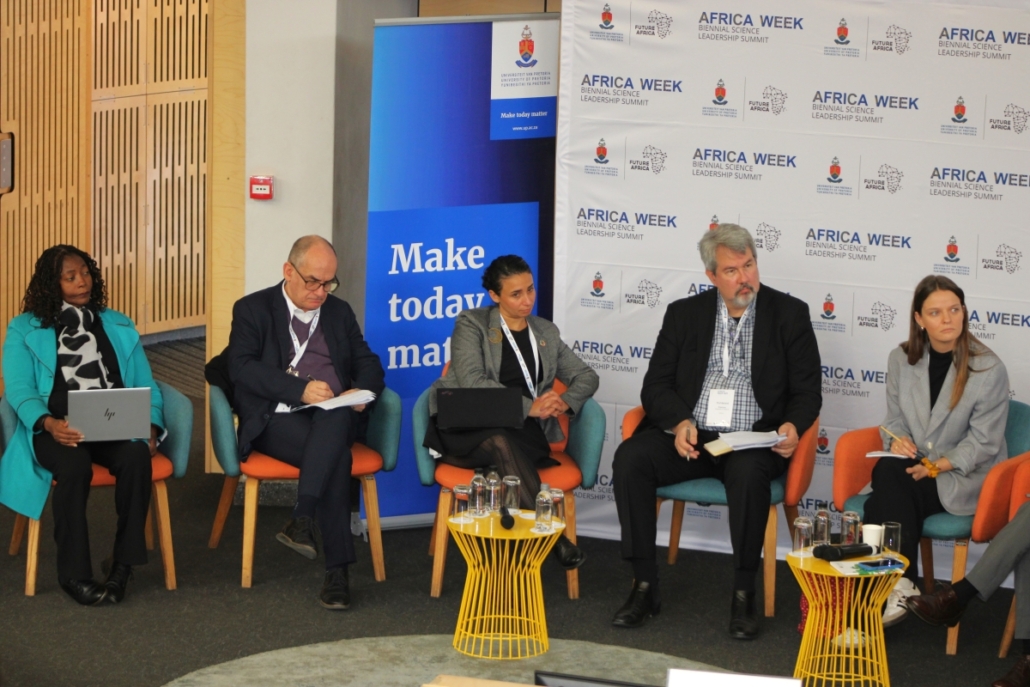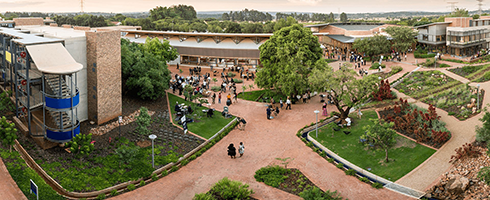‘Africa’s climate future depends on homegrown, just solutions’ – experts at a recent Future Africa panel discussion
PRETORIA – Africa must develop its own answers to the climate crisis or risk deepening existing inequalities. That was the message from Professor Tafadzwa Mabhaudhi at a side event on equitable and just climate action held during Africa Week 2025 at Future Africa, the University of Pretoria’s (UP) pan-African platform for collaborative research.
The event was organised in partnership with the French public research organisations IRD-CNRS-CIRAD’s Joint Office in Southern Africa, and moderated by Professor Wanda Markotter, Interim Director at Future Africa, UP, and Dr Laurent Vidal, Director of the Joint Office.
“We are the ones who are most acutely aware of… the devastation. Because even those of us who are privileged, we do not live so far away from those who are not privileged. So we are able to see,” said Prof Mabhaudhi, Director of the Lancet Countdown Africa Regional Centre at UP and professor of climate change, food systems, and health at the London School of Hygiene and Tropical Medicine.
He argued that although global partnerships matter, Africa must lead with its own ideas. “We are best positioned, first and foremost, in coming up with solutions, and then engaging the rest of the world to partner with us in delivering these solutions. But if we engage with the world from the perspective of looking for solutions at that level, those solutions are not tailored for us.”
Prof Mabhaudhi emphasised that climate action must not only be urgent, it must be grounded in the lived realities of Africans. “Let us remember that Africa is our house, and we owe it to ourselves… to really be Africa-focused, Africa-centred, and drive the solutions from here and engage with everyone else from that perspective.”
Youth at the centre of climate transition
Professor Margaret Chitiga-Mabugu, Dean of the Faculty of Economic and Management Sciences at UP, said climate change is no longer just an environmental concern, but an economic justice issue.
“In sub-Saharan Africa, 35 to 40% of our population lives in extreme poverty.” Extreme poverty, she explained, means surviving on less than $2.15 (R38) per day.
She added that close to half of the continent’s population doesn’t have electricity and 70% of jobs on the continent are in climate-sensitive sectors like agriculture, tourism and mining. “So 70% of our people are devastated each time there is a climate crisis on our continent.”
Current models of climate financing, she said, are exacerbating the problem. “It was mentioned throughout [this summit] just how little we are receiving, despite the fact that we were entitled – I must use this word – to receiving finance from those who had benefited from polluting, those who have not paid the cost of polluting the atmosphere.
“We received just about 10% of global finance and unfortunately about 80% of this is in the form of loans. Again, for those of us who are economists, we’ve seen how devastating this has been for governments, because it has led governments into a financial trap – they’ve accumulated debt, they’ve become less resilient, and have therefore spent less money on social services, on education, on health, on social security.”
Prof Chitiga-Mabugu said a just climate transition must begin with investing in Africa’s people, particularly its youth.
“The fact that Africa will have 40% of the world’s youth population by 2050 is a little bit frightening for me. People talk about youth being a dividend… as an economist, I know for sure that if you have an asset and you don’t invest that asset, you will not reap any dividends – and that’s what we’re doing currently. That asset will be deteriorating very quickly and will soon become a problem for us on the continent.”
Facing irreversible climate thresholds
Prof Barend Erasmus, Dean of the Faculty of Natural and Agricultural Sciences at UP, said Africa still has an opportunity to contribute to global food security, but doing so will require new thinking about what climate resilience means.
“We already experience significant losses, extreme event impacts, but we haven’t even seen the worst of it,” he said. He explained that the emissions causing current damage are from the past five to eight years, and more are already locked in. “Those emissions are the ones causing some of the impacts we’re experiencing now. 2024 was the largest year-on-year increase in global carbon dioxide emissions – it’s never been that high. Now – five years from now – we’ll have that impact coming our way.”
Prof Erasmus also warned against treating climate change as a temporary disruption, saying: “Climate is not an elastic band that you can stretch, and then it comes back to where it was. This is a conflict system. At some point in this system, as you stretch, there’s a transition. And that means you need a new stable state. You don’t go back to where you were before.”
He stressed that adaptation must happen at both local and regional levels. “We’re talking about water schemes, climate-saving crops, improved culture and logistics. And there’s a plethora of other options. But they all cost money.”
Prof Erasmus reminded delegates that, while Africa’s share of global emissions remains relatively small, the impacts are disproportionately large. This makes the case for focusing on transformative adaptation while still advocating for fair mitigation efforts from wealthier nations.
Gendered injustice and climate crisis
Dr Sogol Jafarzadeh, an environmental scientist currently serving as the UN and Government Relations Co-ordinator and Gender and Capacity Building Focal Point for Africa at the United Nations University Institute for Water, Environment and Health, urged delegates to apply a gendered lens to climate action efforts.
“Gender equity is not just a matter of fairness or inclusion. It’s a strategic necessity that we will need to fight climate change impacts,” she said. “When we discuss gender equality issues, it turns into a women’s issue. And I think it’s very important, especially in the scientific community, that we acknowledge it’s not a women’s issue… We need to look at all genders and how climate change impacts them. It’s only then that we can address these issues.”
She described how climate-induced vulnerabilities are experienced unevenly, especially among women and marginalised groups. “What we have been seeing with climate change effects, especially around Africa, is that with the increase in disasters, we see also increasing… sexual assaults.
“We see more food insecurity, lack of access to economic markets, and exchange of sexual favours for access to transportation and economic markets… I live in Zimbabwe, and there are reports now that around urban boreholes, there’s an exchange of sexual favours for access to water and sanitation facilities. In Kenya two years ago, after major floods, we saw a drastic increase in sexual assaults among displaced populations.”
She emphasised that gender-responsive policy is not only possible, but already emerging with countries like Guinea and Nigeria acknowledging the interlinkages of climate change and gender, and having policy frameworks in place to address this.
“We can’t reach climate equity and climate justice without gender equity,” she concluded.





